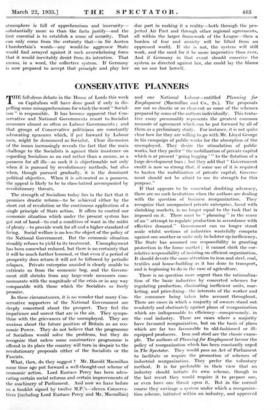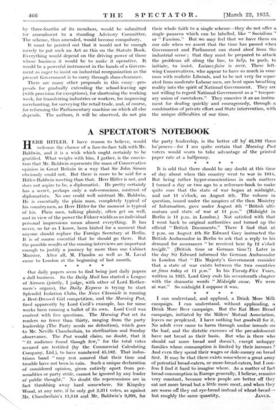CONSERVATI% E PLANNERS
HE full-dress debate in the House of Lords this week T on Capitalism will have done good if only in dis- pelling some misapprehensions for which the word " Social- ism "• is responsible. It has become apparent that Con- servative and National Governments resort to Socialist measures almost as often as Labour Governments ; and that groups, of Conservative politicians are constantly advocating .measures which, if put forward by Labour men, might be denounced as Socialist. Clear discussion of the issues increasingly reveals the .fact that the main challenge to the Socialists is against their insistence on regarding Socialism. as an end rather than a means, as' a panacea for all ills—as such it is objectionable not only when it is pursued by revolutionary methodS, but also when, though pursued gradually, it is the dominant political objective. When it is advocated as a panacea, the appeal is likely to be to class-hatred accompanied by revolutionary threats.
The strength of Socialism today lies in the fact that it promises drastic reform—to be achieved either by the short cut of revolution or the continuous application of a single principle of State action. It offers to control our economic situation which under the, present system has got out of hand--to end a condition of want in the midst of plenty—to provide work for all and a higher standard of living. Social welfare is no less the object of the policy of the National Government. But the economic situation steadily refuses to yield to its treatment. Unemployment has been somewhat reduced, but there is no certainty that it will be much further lessened, or that even if a period of prosperity does return it will not be followed by periodic relapses. Private enterprise unaided is clearly unable to extricate us from the economic bog, and the Govern- ment still shrinks from any large-scale measures com- mensurate with the magnitude of the crisis or in any way comparable with those which the Socialists so freely promise.
In these circumstances, it is no wonder that many Con- servative supporters of the National Government are deeply concerned about the prospect. They feel the impatience and unrest that are in the air. They sympa- thize with the grievances of the unemployed. They are anxious about the future position of Britain as an eco- nomic Power. They do not believe that the programme of Socialism would solve the problems, but they do recognize that unless some constructive programme is offered in its place the country will turn in despair to the revolutionary proposals either of the SocialiSts or the Fascists.
What, then, do, they suggest ? Mr. Harold Macmillan some time ago put forward a well-thought-out scheme of economic' action. Lord Eustace Percy has been advo- cating certain social reforms and certain improvements of the machinery of Parliament. And now we have before us a booklet signed by twelve M.P.'s—eleven Conserva- tives (including Lord Eustace Percy and Mr. Macmillan) and one National Labour—entitled Planning for Employment (Macmillan and Co., 2s.). The proposals are not so drastic or so clear-cut as some of the schemes prepared by some of the authors individually. This tenta- tive essay presumably represents the greatest common measure of agreement which can be put forward by all of them as a preliminary study. For instance, it is not quite clear how far they are willing to go with Mr. Lloyd George in his campaign of public works for the absorption of the unemployed. They desire the stimulation of public works, but they prefer " the mobilization of private capital which is at present going begging ' " to the flotation of a large development loan ; but they add that " Government credit is now so strong that, if some use of it is required to hasten the mobilization of private capital, Govern- ment should not be afraid to use its strength for this purpose."
If that appears to be somewhat doubting advocacy, there are no such hesitations when the authors are dealing with the question of business reorganization. They recognize that unorganized private enterprise, faced with shrinking markets, is no longer equal to the task that is imposed on it. There must be " planning " in the sense of an " attempt to regulate production in accordance with effective demand." Government can no longer stand aside whilst sections of industries wastefully compete against one another or unite only to bolster up inefficiency. The State has assumed one responsibility in granting protection in the home market ; it cannot shirk the cor- relative responsibility of insisting on efficient organization. It should devote the same attention to iron and steel, coal, textiles and house-building as it has done to transport, and is beginning to do in the case of agriculture.
There is no question more urgent than the rationaliza- tion of the basic industries by concerted schemes for regulating production, eliminating inefficient units, mar- keting, and price-fixing--the interests of the worker and the consumer being taken into account throughout. There are cases in which a majority of owners stand out resolutely and obstinately against plans of reorganization which are indispensable to efficiency—conspicuously, in the coal industry. There are cases where a majority have favoured reorganization, but on the basis of plans which are far too favourable to old-fashioned or ill- equipped producers. Iron and steel are the classic exam- ple. The authors of Planning for Employment favour the policy of reorganization which has been constantly urged in The Spectator. They would pass an Act of Parliament to facilitate or require the promotion of schemes of industrial reorganization. They prefer the voluntary method. It is far preferable in their view that an industry should initiate its own scheme, though in the last resort they would require it to prepare one, or even have one thrust upon it. But in the normal course they envisage a system under which a reorganiza- tion scheme, initiated within an industry, and approved by three-fourths of its members, would be submitted for amendment to a standing Advisory Committee. The scheme, thus amended, would become compulsory.
It must be pointed out that it would not be enough merely to put such an Act as this on the Statute Book. Everything would depend on the driving power of those whose business it would be to make it operative. It would be a powerful instrument in the hands of a Govern- ment as eager to insist on industrial reorganization as the present Government is to carry through slum-clearance.
There are many other proposals in this essay—pro- posals for gradually extending the school-leaving age (with provision for exceptions), for shortening the working week, for transferring industries or workers, for improving merchanting, for surveying the retail trade, and, of course, for reforming the Parliamentary machine on which all else depends. The authors, it will be observed, do not pin their whole faith to a single scheme—they do not offer a single panacea which can be labelled, like " Socialism " or " Faseism."- But .we may feel that we have them on our side when we assert that the time has passed when Government and Parliament can stand aloof from the industrial scene ; that they must be prepared to attack the problems all along the line, to help, to push, to initiate, to insist. Laissez faire is .over. . These left- wing Conservatives, who appear to have so much in com- mon with realistic Liberals, and to be not very far separ- ated from moderate Labour men, are bent upon breathing reality into the spirit of National Government. They arc not willing to regard National Government as a " tempor- ary union of caretakers."- They conceive it .as an instru- ment for dealing quickly and courageously, through- a combination of private effort and State intervention, with the unique difficulties of our time.





























































 Previous page
Previous page